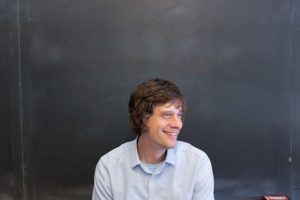
Reading with Zach Davis
Last week, calling Portland from the Digital Scholarship Lab at the Graduate Center, I had the pleasure of speaking with Manifold’s lead developer, Zach Davis at Cast Iron Coding. Yet again, my attempts to record the call came to naught, but I will conjure some of the conversation from my notes.
Zach is Principal Chief Technologist at Cast Iron Coding. His previous CIC projects include sites for the Hammer Museum in Los Angeles, The Edna McConnell Clark Foundation, the Jersey Give-Back Guide (check out the animation on the “generosity generator”) and Debates in Digital Humanities, a collaboration with The University of Minnesota Press and Matt Gold that served as a prototype for the Manifold project.
Zach has been working steadily and seems rejuvenated by the team's recent Portland meeting. Talking through the next steps and considerations about how university presses will be able to customize Manifold installations seems to have crystallized the work that everyone has been doing in exciting ways.
First, I asked Zach what matters most to him about Manifold. He noted the two most important things to him at this stage, made even more clear after the meeting.
- That Manifold is open and open source. Zach says, “it is a pleasure to work on software that has to be open source, where it’s written into the very project.”
- That they are building something that solves a problem for a good number of people. He recognizes the audience, but beyond Manifold’s immediate uses for the press, the software has the potential to serve an even wider segment.
After that we spoke about ideal reading experiences. While his habits have changed since the days when he was a Ph.D. student in English at the CUNY Graduate Center, Zach says it’s "still a book most of the time. It depends on what kind of text. I don’t read theory and criticism the way I used to. For short forms, I will read on the web or my phone, but for reading, I still like the physical artifact.” We talked a bit about the different demands of different types of reading. When he was working on his dissertation, Zach categorized himself as a transcriber. He would cite passages as a way of thinking through the content. Now while working on Manifold, he imagines the sort of tools that would have facilitated this sort of reading. He says he also spent much of his academic life reading digital texts, which were often easier to track down. He thinks about the ways Manifold could simplify the lives of scholars.
What is he reading right now?
- A collection of Leonard Cohen poetry
- Margaret Atwood’s The Handmaid’s Tale
Both seem rather timely.
Lastly, I asked who inspires his work. Zach says lately he has been particularly inspired by the work of Dan Abramov, a JavaScript developer. He finds inspiration in Abramov’s career and particularly appreciates Abramov’s attitude about open source software and towards the community around his work. Now that he has transitioned to his developer role, he finds his book-world inspirations are much the same as they were ten years ago. He says he hopes he in any way resembles the thoughtful, careful, kind approach to work and students that he saw in Milton scholar and mentor Joseph Wittreich at the Graduate Center.
As the project moves on, I’m interested in the ways the underlying experience of the Manifold team influences the way they craft the reading experience.
Thanks, Zach!
Follow @zdavis